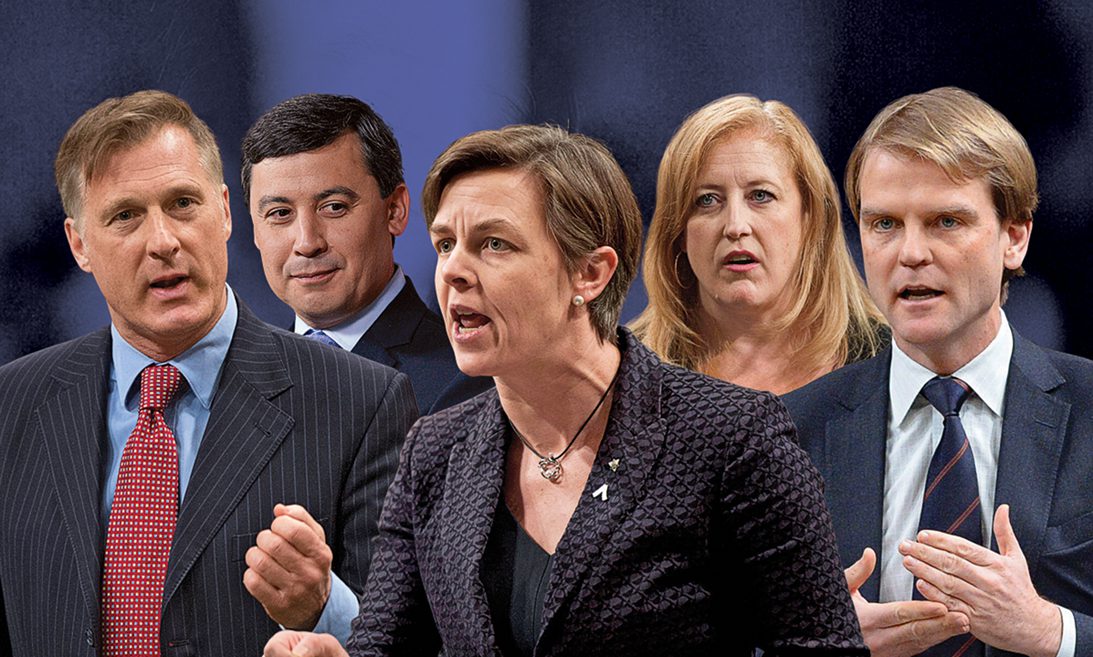If you've paid the slightest bit of attention to the Conservative leadership race so far, you've probably noticed a particular brand of parochialism seeping through much of what gets said and among the kinds of policy items that the various candidates are bringing forward. For a group of people looking to lead a G-7 country, the kind of pride being expressed over not having any real international experience is a bit galling.
Take for example Andrew Scheer, who is one of the candidates leading in endorsements, who made it a point of pride that he spent his honeymoon in Moosejaw, Saskatchewan, while he was deriding Justin Trudeau's Caribbean vacation. While I get that the point was trying to belittle the PM for not being "average Canadian" enough, I'm not sure that it did Scheer any favours in trying to look like he would have a clue about how to conduct himself on the global stage.
Kellie Leitch and Steven Blaney have made suspicion of immigrants part of their platforms, Leitch looking to test would-be immigrants and refugee claimants for "historical" Canadian values, I'm not sure that it paints a picture of a Canada looking to engage on the global stage. The fact that Leitch's supporters go around social media calling out people as "globalists," as though it were some terrible epithet, doesn't help that cause either.
Maxime Bernier has talked about cutting foreign aid as though it has no broader foreign policy implications, or rejecting military engagements that aren't "in Canada's interests," which shows a blinkered view of just what our interests actually are on the global stage and how to exert influence in a myriad of different ways which include assisting allies and preventing problems in hotspots around the world before they can grow and reach us here. Erin O'Toole's big idea is some kind of Canada-UK-Australia-New Zealand pact which sounds a lot more like an anglophile wankfest, appealing to unreconstructed monarchists who dream of some Anglosphere resurgence than in dealing with the modern globe. Don't get me wrong I am a monarchist, but I also get that the Commonwealth is more than those four predominantly white countries.
O'Toole and others have made the point that they're not interested in Canada getting a seat on the UN Security Council, apparently less interested in any kind of influence that we could wield there than they are in doubling down on Stephen Harper's fit of pique when he refused to actually campaign to win the seat when our turn came up. Similarly, I've heard no one talk about walking back from other Harper-era policies like shuttering diplomatic residences (sometimes to the great offence of host countries) and playing cheap on the diplomatic circuit without giving any thought about what kind of message is sends to other countries when we expect our diplomats get by hosting functions that serve only Ritz crackers and ginger ale.
The reflexive appeal to recreate the kind of Harper leadership model is not unsurprising given how most of these candidates came of age politically, but this is a party that needs to evolve beyond more than just a nicer version of Stephen Harper's party. When Harper got elected, he had never been outside of the country beyond a couple of trips to Washington DC, and he eventually grew into the role of elder statesman in the G20, owing in part to his longevity. The problem is that when he became prime minister, it was an era of much more global stability and that even when we had the big global financial crisis in 2008, we weren't worried about the break-up of Europe or a more aggressive Russia trying to assert its influence. This is no longer that era of stability.
This is where I have to wonder if the addition of Kevin O'Leary to the race changes the math in any significant way. O'Leary is the only candidate who has really been able to tout any international business experience, and he provided a heap of perspective sauce at the Halifax debate on Saturday night when he refused to dump all over our justice system by reminding other candidates about just how good we have it here in Canada. But is this something that will resonate with the Conservative membership base?
It may not. O'Leary is in serious jeopardy of being given the Ignatieff treatment, from the time he spends at his "home" in Boston (though he insists that his tax domicile is Toronto), to the fact that he's been spending a significant amount of time campaigning from the States on American networks as opposed to Canadian ones, it certainly opens him up to accusations that he isn't spending enough time in Canada, or in crossing the country to meet more members on the ground. Just insisting that because everyone knows him from TV may not be enough to engage with a voter base that has a history of responding to these kinds of populist signals about their political leaders being regular hockey dads (which Harper wasn't but managed to convince people that he was) than being "elites."
And let's face it there is an elitist air about O'Leary that many other candidates have eschewed, some more successfully than others. But in the rejection of the elite in favour of the parochial, one has to wonder about what the base is rejecting when it comes to the bigger picture. Canada is not an island, and we are very much tied to our unstable neighbour to the south and that will present a great many challenges. Can a hockey mom or dad leader effectively deal with the millionaires and billionaires that inhabit the Trump cabinet? Can they effectively deal with the pressures of a fracturing Europe, or with Russian aggression besides just talking tough about Ukraine without necessarily backing it up with troops or arms? I'm not sure that the Conservative base is asking these questions, nor are the candidates proposing nuanced solutions.






